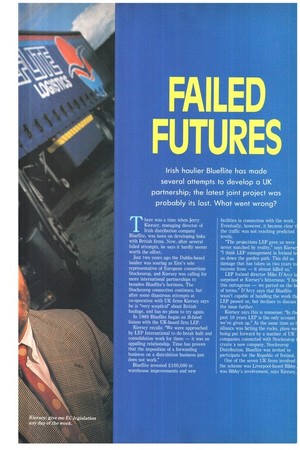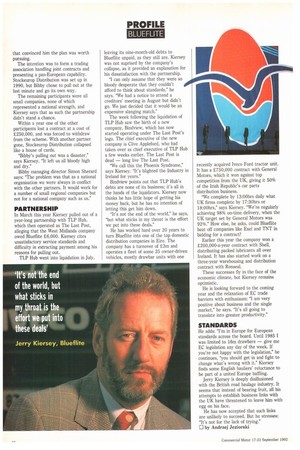FAILED FUTURES
Page 37

Page 38

If you've noticed an error in this article please click here to report it so we can fix it.
Irish haulier Blueflite has made several attempts to develop a UK partnership; the latest joint project was probably its last. What went wrong?
There was a time when Jerry Kiersey, managing director of Irish distribution company Blueflite, was keen on developing links with British firms. Now, after several failed attempts, he says it hardly seems worth the effort.
Just two years ago the Dublin-based haulier was soaring as Eire's sole representative of European consortium Stockeurop, and Kiersey was calling for more international partnerships to broaden Blueflite's horizons. The Stockeurop connection continues, but after some disastrous attempts at co-operation with UK firms Kiersey says he is "very sceptical" about British haulage, and has no plans to try again.
In 1989 Blueflite began an ill-fated liaison with the UK-based firm LEP.
Kiersey recalls: "We were approached by LEP International to do break bulk and consolidation work for them — it was an appalling relationship. Time has proven that the imposition of a forwarding business on a distrubition business just does not work," Blueflite invested t100,000 in warehouse improvements and new facilities in connection with the work. Eventually, however, it became clear t the traffic was not reaching predicted levels.
"The projections LEP gave us were never matched by reality," says Kierse "I think LEP management in Ireland le us down the garden path. This did us damage that has taken us two years to recover from — it almost killed us."
LEP Ireland director Mike D'Arcy is surprised at Kiersey's bitterness: "1 fin this outrageous — we parted on the b of terms." D'Arcy says that Blueflite wasn't capable of handling the work th LEP passed on, but declines to discuss the issue further.
Kiersey says this is nonsense: "In th past 10 years LEP is the only account we've given up." At the same time as t alliance was hitting the rocks, plans we being put forward by a number of UK companies connected with Stockeurop create a new company, Stockeurop Distribution. Blueflite was invited to participate for the Republic of Ireland.
One of the seven UK firms involved the scheme was Liverpool-based Bibby. was Bibby's involvement, says Kiersey, that convinced him the plan was worth pursuing.
The intention was to form a trading association handling joint contracts and presenting a pan-European capability. Stockeurop Distribution was set up in 1990, but Bibby chose to pull out at the last minute and go its own way.
The remaining participants were all small companies, none of which represented a national strength, and Kiersey says that as such the partnership didn't stand a chance.
Within a year one of the other participants lost a contract at a cost of £250,000, and was forced to withdraw from the scheme. With another partner gone, Stockeurop Distribution collapsed like a house of cards.
13ibby's pulling out was a disaster," says Kiersey. "It left us all bloody high and dry."
Bibby managing director Simon Sherard says: "The problem was that as a national organisation we were always in conflict with the other partners. It would work for a number of small regional companies but not for a national company such as us."
PARTNERSHIP
In March this year Kiersey pulled out of a year-long partnership with TLP Hub, which then operated as The Last Post, alleging that the West Midlands company owed Blueflite £6,000. Kiersey cites unsatisfactory service standards and difficulty in extracting payment among his reasons for pulling out.
TLP Hub went into liquidation in July, leaving its nine-month-old debts to Blueflite unpaid, as they still are. Kiersey was not suprised by the company's collapse, as it provided an explanation for his dissatisfaction with the partnership.
"I can only assume that they were so bloody desperate that they couldn't afford to think about standards," he says. "We had a notice to attend a creditors' meeting in August but didn't go. We just decided that it would be an expensive slanging match."
The week following the liquidation of TLP Hub saw the birth of a new company, Bindview, which has now started operating under The Last Post's logo. The chief executive of the new company is Clive Appleford, who had taken over as chief executive of TLP Hub a few weeks earlier. The Last Post is dead — long live The Last Post.
"We call this the Phoenix Syndrome," says Kiersey. "It's blighted the Industry in Ireland for years."
Bindview points out that TLP Hub's debts are none of its business; it's all in the hands of the liquidators. Kiersey now thinks he has little hope of getting his money back, but he has no intention of letting this get him down.
"It's not the end of the world," he says, "but what sticks in my throat is the effort we put into these deals."
He has worked hard over 20 years to turn Blueflite into one of the top domestic distribution companies in Eire. The company has a turnover of £3m and operates a fleet of some 35 owner-driven vehicles, mostly drawbar units with one recently acquired Iveco Ford tractor unit. It has a £750,000 contract with General Motors, which it won against top competition from the UK, giving it 509'6 of the Irish Republic's car parts distribution business.
"We complete by 13:00hrs daily what UK firms complete by 17:30hrs or 18:00hrs," says Kiersey. "We're regularly achieving 98% on-time delivery, when the UK target set by General Motors was 92%." How else, he asks, could Blueflite beat off companies like Exel and TNT in bidding for a contract?
Earlier this year the company won a £200,000-a-year contract with Shell, distributing packed lubricants all over Ireland. It has also started work on a three-year warehousing and distribution contract with Ronseal.
These successes fly in the face of the economic climate, but Kiersey remains optimistic.
He is looking forward to the coming year and the relaxation of EC trade barriers with enthusiasm: "I am very positive about business and the single market," he says. "It's all going to translate into greater productivity."
STANDARDS
He adds: "I'm in Europe for European standards across the board. Until 1985 1 was limited to 16m drawbars — give me EC legislation any day of the week. If you're not happy with the legislation," he continues, "you should get in and fight to change what's wrong with it." Kiersey finds some English hauliers' reluctance to be part of a united Europe baffling.
Jerry Kiersey is deeply disillusioned with the British road haulage industry. It seems that instead of bearing fruit, all his attempts to establish business links with the UK have threatened to leave him with egg on his face.
He has now accepted that such links are unlikely to succeed. But he stresses: "It's not for the lack of trying."
by Andrzej Jeziorski




























































































